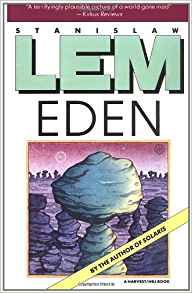 translated from the Polish by Marc E. Heine
translated from the Polish by Marc E. Heine
originally published in Poland: 1959
my edition: Harcourt (September 1, 1989)
262 pages
** spoilers
Reading Eden right after The Star Diaries gave me a kind of literary whiplash: while the former is an irreverent, darkly-comic joyride around the universe; the latter is a grim and somewhat pessimistic story about humans crash-landing on an alien world. Humor gives way to profound philosophical, ethical, and cosmic issues that go to the very heart of how humans might someday make contact with an alien species and how we would even be able to interpret what we see.
Here, Lem gives his characters titles instead of names–the Captain, the Doctor, the Engineer, the Cyberneticist, the Physicist, and the Chemist–suggesting that we focus not on these people as individuals but as both representative humans and as six different but equally-valuable perspectives. Indeed, each character brings their specific skills to bear on solving the multiple mysteries of Eden, a planet that seems like a cross-between a wasteland and a burial ground.
When the six humans crash onto the planet, their ship is badly damaged, but still repairable, and they alternate between exploring their immediate surroundings and trying to fix the ship. What they find on their expeditions are disturbing mysteries that suggest that some apocalyptic event happened hundreds or thousands of years before. In their short expeditions away from the ship, the humans come across spinning-flying silver disks (transportation devices), spider-like plants, energy fields, a broken-down bio-mechanical “factory,” burial pits that contain alien bodies with strange appendages, and small settlements filled with paired aliens. Immediately the issue of defense/weapons/violence comes up, with the Doctor cautioning his colleagues against aggression and trying to come up with an approach that wouldn’t put the humans in danger but still open communications with the aliens. With each expedition, the men build up their own complex, highly-speculative theory about the life on Eden and its history: perhaps some disease killed off most of the population and left the others with crippling deformities? perhaps one faction attacked another and the burial pits are filled with victims of genocide? or maybe the aliens simply devolved after thousands of years and all the humans have found is a pathetic remnant?
Once the six men do finally encounter living creatures, the aliens seem terrified and confused, and not even aware of the humans in their midst. Eventually, and at two different times, two aliens (which the men call “doublers”) approach the humans and their ship: one behaves like a domesticated animal, while the other (wearing clothing, communicating via a coughing sound) strikes the humans as a kind of Edenite astronomer (because of his star maps). When the men figure out how to communicate with the second alien via their ship’s computer, they piece together a story of oppression, censorship, internment, and psychological torment: all terms, of course, from Earth, and not necessarily applicable to Eden. Their subsequent discussion is one that we hear in reference to other countries on our own planet even in this century: should one group of people interfere in the internal affairs of another group of people and try to change things “for the better,” knowing (almost) nothing about the other culture/people and imposing their own values and interpretations on situations they can’t understand? Through the Captain and a couple of the other humans, Lem makes a convincing argument against interference. At one point, the Captain points out that “[t]hese are beings with a physiology, psychology, and history different from ours. You can’t transplant a model of our civilization here” (219). The humans wind up blasting off from Eden in their repaired ship, but not without leaving behind a trail of destruction and misunderstanding.
Ultimately, Eden is not concerned with character development or a clear plotline. Instead, it is a kind of detailed travelogue focusing on strange alien technology and biology, with descriptions of the landscape and plant-life that go on for pages at a time. Lem, it seems, is inviting us to explore the otherworldly landscape that he’s created in his mind, and asking us to put ourselves in the place of the Chemist, for example, or the Doctor, and ponder what we would do in a similar situation.
Eden asks us to consider it on its own terms: as a cautionary tale about misinterpretation, authoritarianism, and the human urge to interpret that which cannot ever be fully explained.
